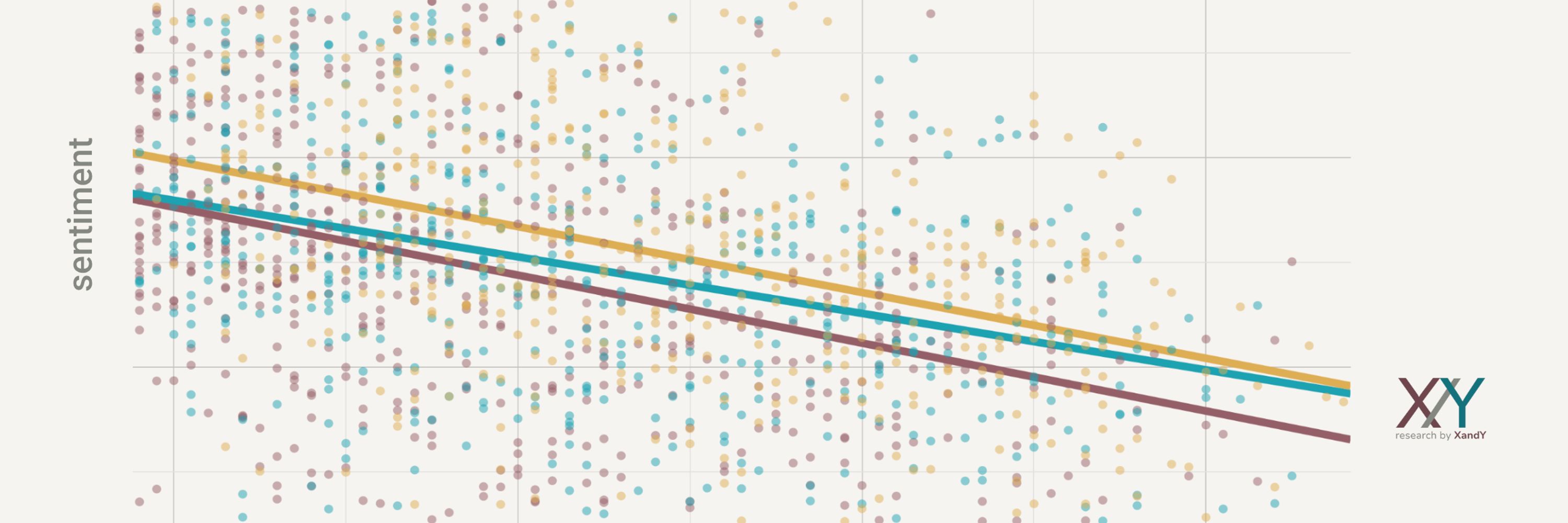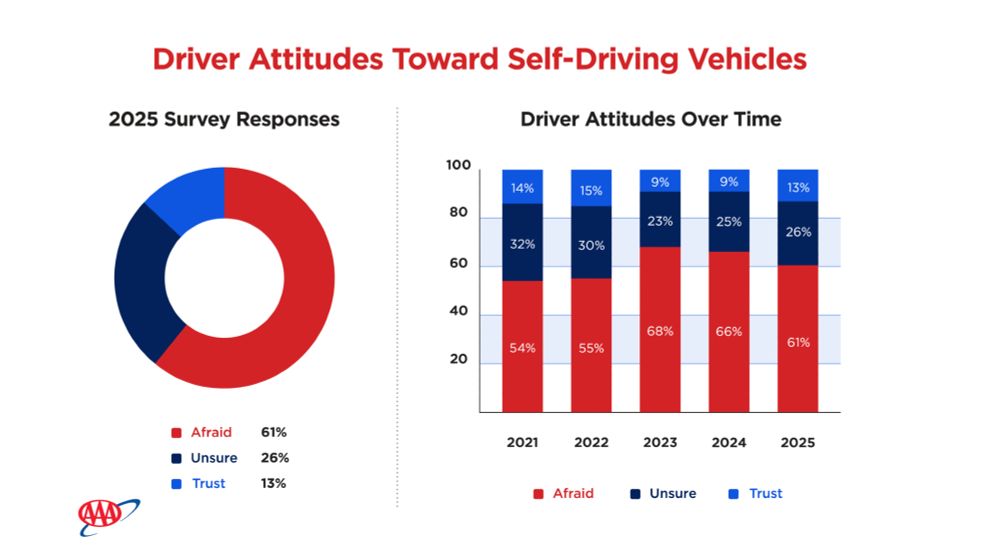
XandY
@xandyresearch.bsky.social
Founded by two Yale scientists, XandY is an independent research firm that helps accelerate the world's most important new ideas.
But this is a challenge to overcome right now, because a majority of Americans still don't know that AVs are MUCH safer (less likely to get into accidents) than human drivers.
We need strategic campaigns and interventions to quickly shift public perception on this.
We need strategic campaigns and interventions to quickly shift public perception on this.

October 10, 2025 at 2:30 PM
But this is a challenge to overcome right now, because a majority of Americans still don't know that AVs are MUCH safer (less likely to get into accidents) than human drivers.
We need strategic campaigns and interventions to quickly shift public perception on this.
We need strategic campaigns and interventions to quickly shift public perception on this.
These NIMBY ("not in my backyard") tendencies are a consistent barrier to progress across many key issues (renewables, housing, etc.). Many people support an idea in principle, but become resistant when it is applied to their local area.
August 28, 2025 at 3:17 PM
These NIMBY ("not in my backyard") tendencies are a consistent barrier to progress across many key issues (renewables, housing, etc.). Many people support an idea in principle, but become resistant when it is applied to their local area.
Neither side (AVs safer vs humans safer) has a clear majority because so many people either estimate equal safety (29%) or simply don't know (11%). Public sentiment rests at a tipping point where the events and narratives of the next few years will determine which cultural norms are solidified.
August 21, 2025 at 1:47 PM
Neither side (AVs safer vs humans safer) has a clear majority because so many people either estimate equal safety (29%) or simply don't know (11%). Public sentiment rests at a tipping point where the events and narratives of the next few years will determine which cultural norms are solidified.
This showcases the wide gaps in familiarity that are common with emerging technology. Even when a new thing has become routine or familiar among Early Adopters, it can still be mostly foreign to a large portion of the general public.
August 15, 2025 at 3:34 PM
This showcases the wide gaps in familiarity that are common with emerging technology. Even when a new thing has become routine or familiar among Early Adopters, it can still be mostly foreign to a large portion of the general public.
Overall, this highlights the importance of public education and clear communication about the practical utility of blockchain tech.
August 7, 2025 at 1:04 AM
Overall, this highlights the importance of public education and clear communication about the practical utility of blockchain tech.
It's no surprise that many Americans who have never owned any digital assets are mostly unfamiliar with the uses of blockchain tech.
But what IS a surprise is that the data from our national study shows that most Americans who HAVE owned digital assets also have low familiarity.
But what IS a surprise is that the data from our national study shows that most Americans who HAVE owned digital assets also have low familiarity.
August 7, 2025 at 1:04 AM
It's no surprise that many Americans who have never owned any digital assets are mostly unfamiliar with the uses of blockchain tech.
But what IS a surprise is that the data from our national study shows that most Americans who HAVE owned digital assets also have low familiarity.
But what IS a surprise is that the data from our national study shows that most Americans who HAVE owned digital assets also have low familiarity.
While adoption of new tech can be a slow process, it’s encouraging to see even among those who have never owned crypto, about half see themselves as either likely to own in the future (13%), or just on the fence (37%).
July 31, 2025 at 7:41 PM
While adoption of new tech can be a slow process, it’s encouraging to see even among those who have never owned crypto, about half see themselves as either likely to own in the future (13%), or just on the fence (37%).
Also, more than half (61%) say they feel "afraid" about AVs while only 13% say they "trust" them.
This suggests consumers prefer incremental innovations that improve safety without giving up control.
We should position self-driving as an evolution from ADAS rather than a sudden leap.
This suggests consumers prefer incremental innovations that improve safety without giving up control.
We should position self-driving as an evolution from ADAS rather than a sudden leap.

July 24, 2025 at 3:44 PM
Also, more than half (61%) say they feel "afraid" about AVs while only 13% say they "trust" them.
This suggests consumers prefer incremental innovations that improve safety without giving up control.
We should position self-driving as an evolution from ADAS rather than a sudden leap.
This suggests consumers prefer incremental innovations that improve safety without giving up control.
We should position self-driving as an evolution from ADAS rather than a sudden leap.
This is a pretty good sign! It means lack of prior involvement does not imply opposition. There are many millions of Americans who are simply unsure, uninformed, ambivalent, or apathetic. When thinking about social change, that's a much better situation than widespread opposition or resistance.
July 16, 2025 at 3:07 PM
This is a pretty good sign! It means lack of prior involvement does not imply opposition. There are many millions of Americans who are simply unsure, uninformed, ambivalent, or apathetic. When thinking about social change, that's a much better situation than widespread opposition or resistance.
One reason could be that those 18-24 group don't have resource for digital assets yet. But another possibility is that interest in crypto peaked in the cohort before them, and largely has not carried over into the next generation.
Time will tell us more as Gen Z ages into higher earning roles.
Time will tell us more as Gen Z ages into higher earning roles.
July 10, 2025 at 6:56 PM
One reason could be that those 18-24 group don't have resource for digital assets yet. But another possibility is that interest in crypto peaked in the cohort before them, and largely has not carried over into the next generation.
Time will tell us more as Gen Z ages into higher earning roles.
Time will tell us more as Gen Z ages into higher earning roles.
In the free full article linked here, we provide a deeper explanation for why this happens, and what we can do to fix this.
www.xandyanalytics.com/the-crypto-k...
www.xandyanalytics.com/the-crypto-k...

The Crypto Knowledge Gap — XandY
This article summarizes data from The XandY Poll on the benefits and risks of crypto that Americans are aware of. The findings show that most people cannot identify any specific benefits or risks. Thi...
www.xandyanalytics.com
February 19, 2025 at 3:13 PM
In the free full article linked here, we provide a deeper explanation for why this happens, and what we can do to fix this.
www.xandyanalytics.com/the-crypto-k...
www.xandyanalytics.com/the-crypto-k...
Most companies overestimate public understanding of new technologies. Experts and insiders are the most likely to be blind to this. One of the most important ingredients for mass adoption is just a clear, simple communication strategy that lowers the barriers to entry and assuages common concerns.

February 19, 2025 at 3:13 PM
Most companies overestimate public understanding of new technologies. Experts and insiders are the most likely to be blind to this. One of the most important ingredients for mass adoption is just a clear, simple communication strategy that lowers the barriers to entry and assuages common concerns.
When asked to describe any risks or benefits of crypto that they are aware of, more than half of U.S. adults say they don’t know of any. Overall, only about 1 in 4 Americans can name any specific risks of crypto and only about 1 in 5 can name a specific benefit.

February 19, 2025 at 3:13 PM
When asked to describe any risks or benefits of crypto that they are aware of, more than half of U.S. adults say they don’t know of any. Overall, only about 1 in 4 Americans can name any specific risks of crypto and only about 1 in 5 can name a specific benefit.

